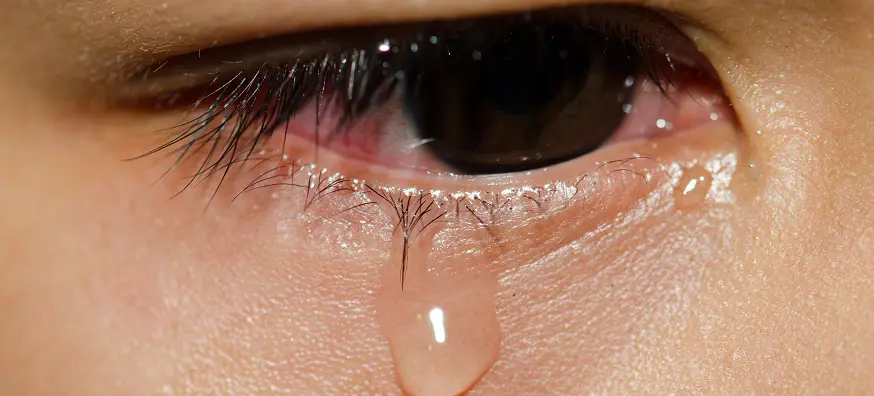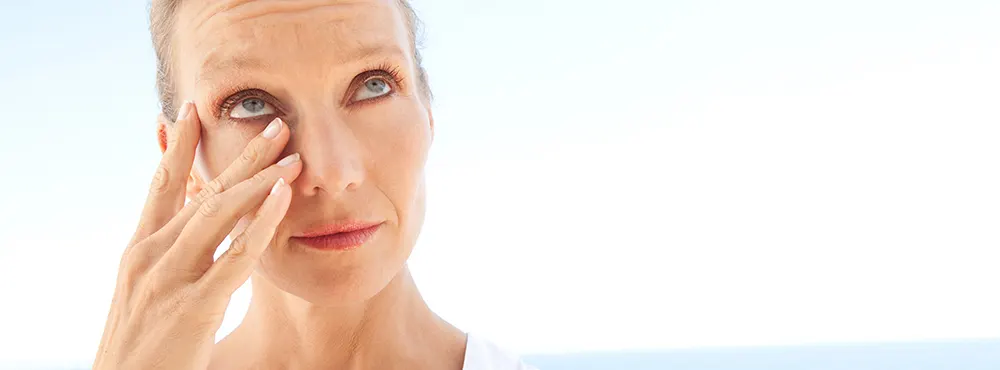Your eyes can water at any time, in the park, on the train, even just by stepping outside. If you produce too many tears, it could be due to a range of eye conditions and eyelid problems. We have a look at some of the reasons for your excessive tears and some eye care practices which can help.
What causes watery eyes?
Your sore, watery eyes could be the result of:
- Debris/foreign object in the eye
-
Dry eye syndrome
-
Conjunctivitis (pink eye)
- A smoky environment
-
Allergies
- Cold weather
- A blocked tear duct
- Make-up
- Chemical fumes
- Ectropion (outwardly turned eyelid)
- Entropion (inwardly turned eyelid)
How do you stop your eyes from watering?
The watery eyes treatment you need will depend on the cause. Here are some common causes and suggested remedies for how to stop watery eyes.
Are watery eyes a symptom of coronavirus?
At the time of writing this, watery eyes are not a symptom of coronavirus (COVID-19). Having excess tears is fairly common, and the underlying reason is usually nothing to be concerned about.
Itchy watery eyes from hay fever
If you’re experiencing sore, watery eyes from pollen, then using some eye drops will help to soothe tired eyes. Some eye drops for watery eyes contain antihistamines to fight the allergic response as well as decongestants to reduce redness.
Artificial tears can also be used to rinse the allergens or debris away from the eyes.

Why do my eyes get watery when I wear makeup?
Make-up can enter the eye and cause irritation. The waterline is where the meibomian gland produces oil, which keeps tears on the eye’s surface to provide hydration. When make-up is put on the waterline, it removes the oils there, which stops the tears from being able to stick to the surface of the eye, causing your eyes to water. This can be very annoying if you’ve spent a lot of time carefully applying your eye make-up. Some ways to avoid this are to:
- Ensure your make-up is not expired
- Ensure your brushes are clean
- Use some eye drops before application
- Don’t apply make-up to the waterline
- Close your eyes when applying powder around the eyes
Red watery eyes from smoke
Eye symptoms of smoke exposure include:
- Blurred vision
- The feeling of something in your eye
- Dry eye
- Watery eyes
Your eyes can become incredibly irritated when exposed to smoke for long periods of time. The source could be from cigarette smoke, forest or domestic fires, bonfires etc. To help your eyes feel better, avoid wearing contact lenses for a while, stay inside if possible and rinse your eyes with saline or artificial tears. You could also use our soothing Thera-Peral Eye Mask, which can be used as a warm compress or cold one, to relieve irritated eyes.
How to stop watery eyes from the cold
It’s natural for your eyes to water when exposed to colder temperatures; this is because the cold air evaporates the moisture from our eyes which then triggers the eyes to produce more tears. This can be avoided by making sure your eyes are hydrated before venturing outside. Eye drops can help lubricate the eyes to minimise the chance of them overwatering when outside in the cold.
Dry watery eyes
Dry eyes, whether a temporary problem or a continuous issue, can make eyes feel irritated and watery. The meibomian gland (or the oil gland) produces oil which helps the tears across the eyes surface not to spill over, retaining moisture and comfort. When the oil glands don't produce enough oil to keep tears on the eyes, the tears spill over causing watery and dry eyes.
Some ways to relieve dry eyes and make them less watery include:
- Not using contact lenses
- Getting enough sleep
- Taking regular breaks from computer and phone screens
- Using artificial tears
When to see your GP
There are a wide range of reasons that your eyes could be watering more than usual. If it starts to become a constant problem, then it might be time to consider getting your eyes checked. You should seek medical advice from your GP or optometrist if you experience:
- A change in vision
- Painful eyes
- Swollen eyes
- Lumps on the eye
- The eyelid turning inwards or outwards
Disclaimer: The advice in this article is for informational purposes only and does not replace medical care or an in-person check-up. Please check with an eyecare professional before purchasing any products or remedies. For information on our article review process, please refer to our Editorial Policy.

 Offers
Offers Account
Account
 Favorite
Favorite
 Basket
Basket

 OFFERS
OFFERS

















